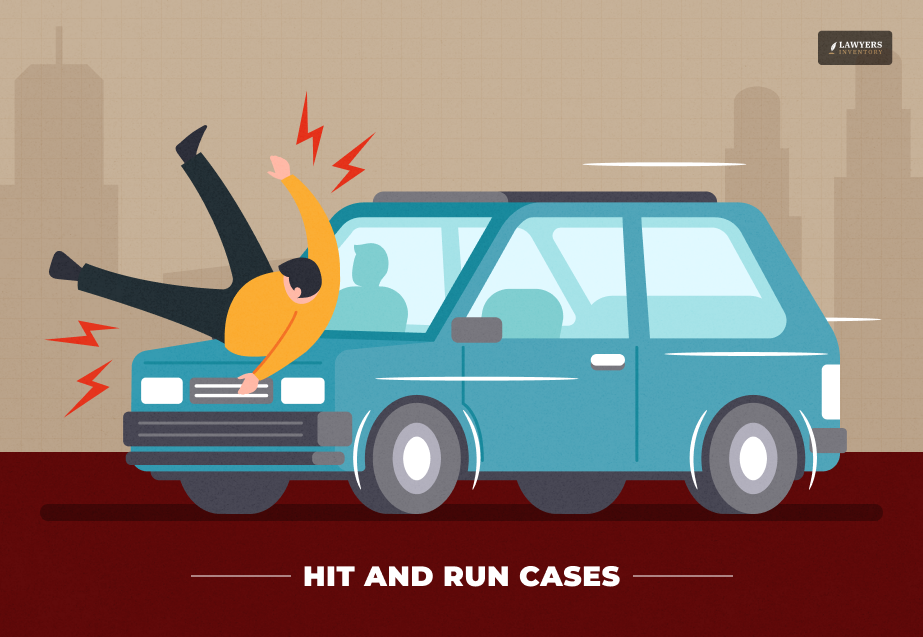
Firstly, in case you have been googling, “I committed a hit and run how long will it take for the police to find me,” what the hell is wrong with you!?
Secondly, irrespective, I am here to help you out!
Hit-and-run accidents are becoming alarmingly common, leaving victims and authorities grappling with unanswered questions.
According to a recent report by the World Health Organization (WHO), road traffic accidents are one of the leading causes of death globally, and hit-and-run cases contribute significantly to these numbers.
In the United States alone, the AAA Foundation for Traffic Safety found over 737,000 hit-and-run crashes in a single year, equating to about one every 43 seconds.
When a driver leaves the scene of an accident without stopping to assist or report, it’s not just illegal—it’s also deeply distressing for those involved.
If you’ve committed a hit-and-run, you might be overwhelmed with fear, guilt, and a flood of questions. How soon will the police track you down? What steps do they take to identify the offender?
In this article, I will break down the investigative process, explain the legal implications, and help you understand what to expect. I aim to provide clarity and guidance by shedding light on these aspects during this challenging time.
Understanding Hit and Run Cases
While most of you searching for information on this topic already know what this means, let me give you a brief description.
A hit-and-run occurs when a driver causes an accident and then leaves the scene without stopping to help or provide their information.
It’s a serious crime in most places, and the penalties can be harsh—ranging from hefty fines to prison time, depending on the severity of the accident and any injuries involved.
A hit-and-run’s central focus is the driver leaving without taking responsibility for what happened.
While driving away might be tempting, doing so usually only worsens things. In many cases, the consequences of fleeing can be more severe than staying at the scene, especially if you have hurt anyone.
So, how do police track down hit-and-run drivers?
They gather evidence from the crash site, like vehicle parts, witness accounts, and even security camera footage.
Modern technology, such as vehicle tracking systems and facial recognition, helps authorities track offenders faster.
Here’s the key thing to remember: running away doesn’t mean you’ll escape the law. With today’s investigative tools and the public’s help, staying hidden is harder than ever.
It’s always better to face the situation rather than try to avoid it—it might be tough, but it’s the right thing to do.
Answering, “I Committed a Hit and Run How Long Will It Take For the Police to Find Me?”
If you’re asking how long it will take for the police to find you after a hit-and-run, it varies. There’s no set time. However, the good news is law enforcement has many ways to track down offenders quickly.
How long it takes depends on a few things. For instance,
- How serious the accident was
- The evidence available
- The effort that goes into the investigation.
When a hit-and-run happens, the police will gather all sorts of evidence from the scene.
Witnesses, security cameras from nearby businesses, and even bits of your vehicle left behind can all help lead them to you.
And, if the police can identify your car or its parts, they might be able to track you pretty fast.
It’s important to know that the police want to solve hit-and-run cases as quickly as possible because these accidents can be dangerous.
With modern technology—like license plate readers and social media—authorities can often find you sooner than expected.
Ultimately, running away might delay things, but getting away with a hit-and-run is hard. Even if it’s tough, facing the situation head-on is almost always the best choice.
Are There Different Types of Hit and Run Cases?
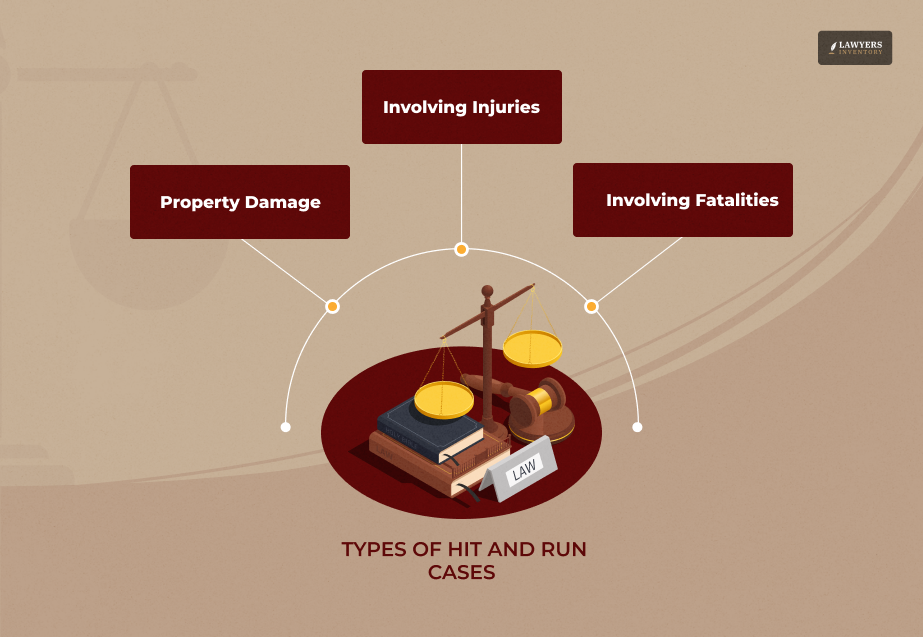
Before going online and searching “I committed a hit and run how long will it take for the police to find me,” you need to know one thing.
Different types of hit-and-run cases involve different punishments. Additionally, the time police take to find the culprit depends on the severity and the type.
“Does that mean there are different types of hit and run?”
Yes, hit-and-run cases can vary widely, depending on the circumstances of the accident. Understanding the different types can help you grasp the potential legal consequences and what to expect.
Let’s break them down:
1. Property Damage Only
These are hit-and-run cases where a vehicle, fence, mailbox, or other property is damaged, but no one is injured. For example, this category falls into hitting a parked car and leaving without leaving your information. While the consequences are typically less severe, you could still face fines, a license suspension, and higher insurance rates.
2. Involving Injuries
If the hit-and-run accident has injured someone, and you flee the scene, the situation becomes much more serious. This includes hitting a pedestrian, cyclist, or another driver. Leaving without offering assistance or calling for help could result in felony charges, especially if the injuries are severe.
3. Involving Fatalities
The law treats those hit-and-run cases as the most serious types where someone dies. These incidents often lead to felony charges, long sentences, and significant fines.
How Long Does Hit and Run Investigation Take?
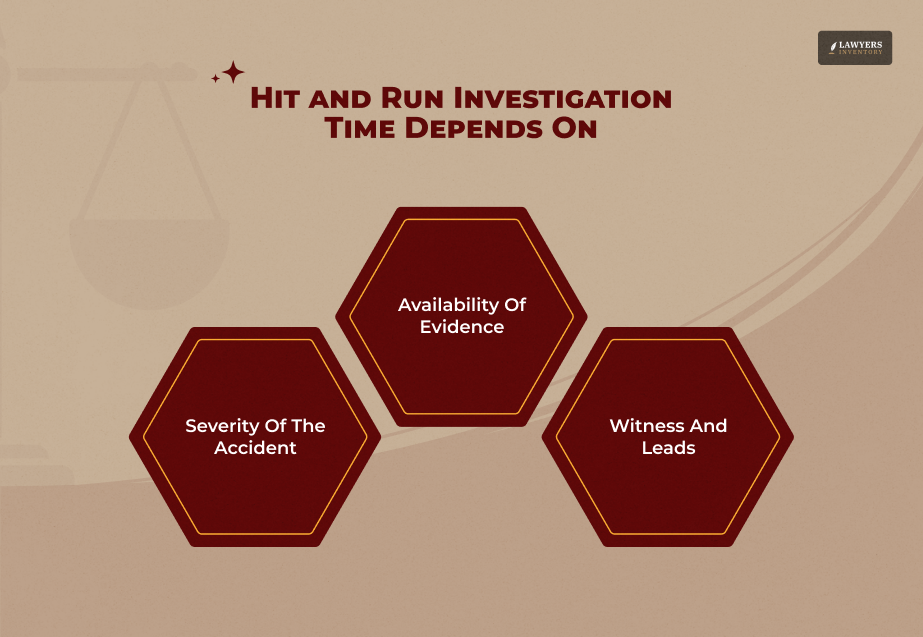
There’s no one-size-fits-all answer to how long a hit-and-run investigation takes because it depends on several factors.
These include the accident’s severity, the evidence available, and how quickly witnesses or leads surface.
In some cases, the police may identify the driver within hours; in others, it could take weeks or even months to solve.
The investigation might take longer for minor accidents with limited evidence since the law enforcement dedeicates fewer resources to solving the case.
However, in hit-and-run incidents involving serious injuries or fatalities, law enforcement usually prioritizes the case, working around the clock to find the person responsible.
The process often begins at the scene of the accident. Police gather evidence like vehicle debris, tire marks, and surveillance footage from nearby cameras.
Witnesses also play a big role, as their statements can provide crucial details about the car, driver, or direction they fled.
Advanced tools like license plate readers and public tips through social media further speed up the process.
While the timeline can vary, as mentioned before, modern technology and investigative methods make it harder to avoid detection.
Possible Legal Consequences in Hit and Run Cases?
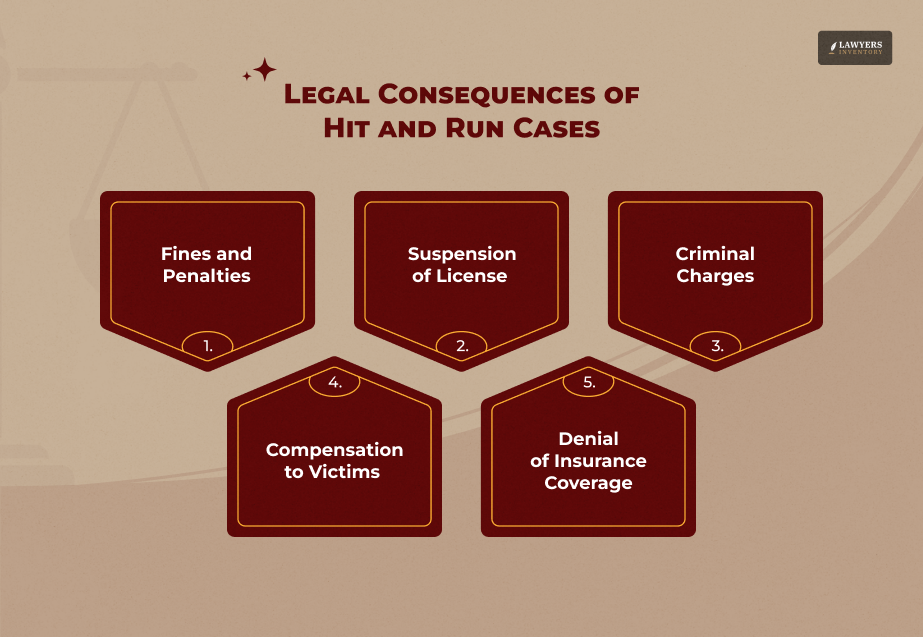
If you’ve been involved in a hit-and-run, it’s important to understand the potential legal consequences. The penalties depend on the severity of the accident and the laws in your jurisdiction, but they can range from fines to imprisonment.
Here’s what you might face:
1. Fines and Penalties: Most hit-and-run cases result in significant fines, ranging from a few hundred to thousands of dollars, depending on the damage and injuries caused.
2. License Suspension or Revocation: Leaving the scene of an accident often leads to the suspension or even permanent loss of your driver’s license.
3. Criminal Charges: Hit-and-run offenses can be charged as misdemeanors or felonies. Minor property damage is typically a misdemeanor, but if someone is injured or killed, you’re likely looking at a felony charge, which can mean years in prison.
4. Restitution to Victims: Courts may require you to compensate victims for medical bills, vehicle repairs, or other losses they suffered due to the accident.
5. Increased Insurance Rates or Denial of Coverage: Your insurance premiums will likely skyrocket, or your provider could cancel your policy altogether.
Can You Get a Bail in Hit and Run Cases?
Yes, you can apply for bail in most hit-and-run cases, but whether the court grants it to you depends on several factors.
The severity of the accident plays a big role. For example, bail is typically easier to obtain if the incident only caused property damage since it’s considered a less serious offense.
However, if the hit-and-run involves injuries or fatalities, the legal process becomes more complicated, and getting bail may require stronger arguments from your legal team.
Courts also consider your criminal record, the likelihood of fleeing, and whether you voluntarily turned yourself in. If you took responsibility for your actions, it may work in your favor when requesting bail.
Remember that bail amounts can vary widely depending on your jurisdiction and the specifics of your case.
Can You Fight a Hit and Run Charge?
Another yes! You can fight a hit-and-run charge, but doing so requires strong legal representation and a clear strategy. The defense will largely depend on the circumstances of the incident and the evidence against you.
One common defense is proving that you weren’t aware an accident occurred. For example, in minor accidents, a driver might not realize they caused damage, especially if it was a small bump. If you genuinely didn’t know about the accident, this could help reduce or dismiss your charges.
Another possible defense is showing that you could not stop due to an emergency, such as being in immediate danger or getting to safety. However, you’ll need evidence to support this claim.
Sometimes, hit-and-run accusations are based on mistaken identity. If the police believe your car was involved but you weren’t the driver, your attorney can work to clear your name by presenting evidence like alibis or surveillance footage.
When Should You Consult a Criminal Defense Attorney?
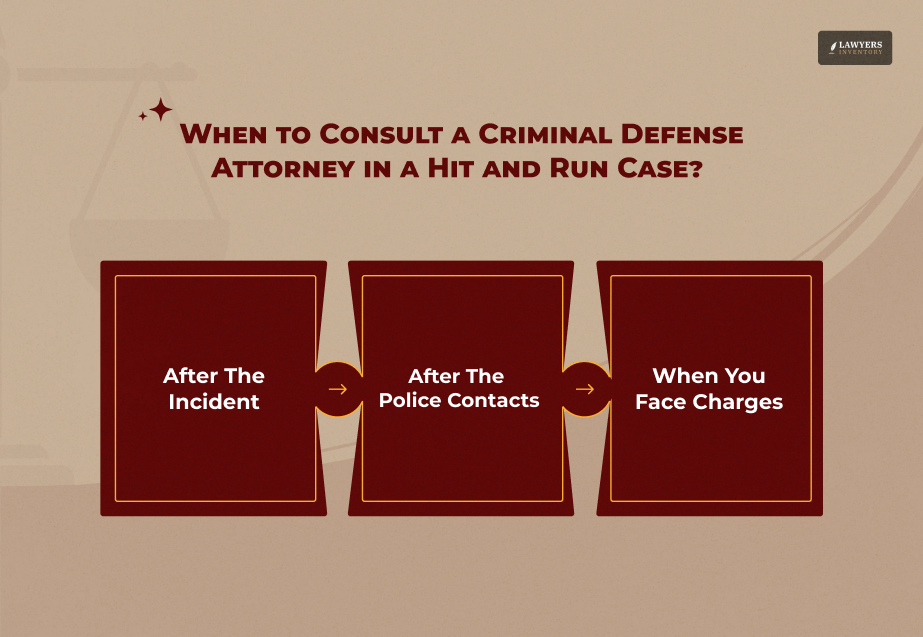
Consulting a criminal defense attorney should be one of your first steps if you’ve been involved in a hit-and-run.
Working with an experienced criminal defense lawyer ensures that your case is handled professionally and your rights are safeguarded.
The sooner you seek legal help, the better your chances of protecting your rights and minimizing the potential consequences.
Here’s when you should reach out:
1. Immediately After the Incident
If you’ve fled the scene of an accident, don’t wait to take action. Contact an attorney as soon as possible. They can guide you in navigating the legal process, advise whether to turn yourself in and explain what to expect regarding penalties. Acting quickly can make a significant difference in your case.
2. When Police Contact You
If law enforcement has contacted or begun questioning you about the incident, it’s time to involve an attorney. Anything you say to the police can be used against you, so it’s crucial to have legal representation before speaking with authorities.
3. If You’ve Been Charged
You need an attorney if you’re formally charged with a hit-and-run. They can evaluate the evidence against you, identify possible defenses, and negotiate on your behalf to reduce charges or penalties.
Read Also:
- Understanding Your Rights: Navigating a Criminal Defense Case from Arrest to Trial
- When Do You Need to Hire a Car Accident Lawyer?
- The Cyclist’s Guide to Biking Safely in the City






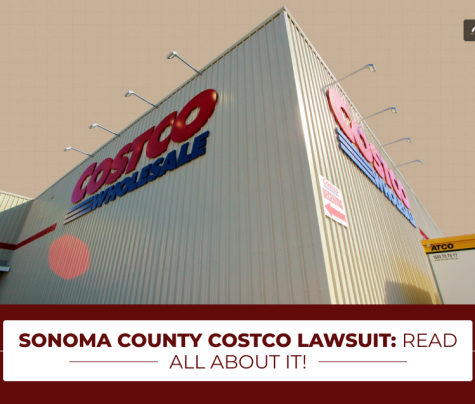




0 Reply
No comments yet.